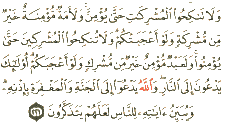-
221. " and do not marry idolater women until they believe,
and a believing maid is definitely preferable to an idolater (free) woman
even though she may please you.
nor give (your women) in marriage to idolater men until they believe;
and certainly a believing servant is preferable to an idolater (free man),
though he may please you.
those invite to the fire while allah invites to paradise and forgiveness
by his will,
and he makes clear his signs to people,
so that they may take heed."
occasion of revelation:
once there came a man into mecca by the name of marthad. he
was a brave man who had converted to islam. he occasionally met
" `anagh ", the beautiful woman whom he was acquainted with formerly,
at the time of ignorance. she invited him to sinful actions as before, but
marthad, who had become a muslim, did not accept her wish. hence,
the woman asked him to marry her. marthad replied that it was
contingent on the permission of the prophet (p.b.u.h.). then, after
performing his affairs, he returned to medina and told the prophet
(p.b.u.h.) about the matter. so, this verse was revealed and stated that
the idol-worshippers and pagan women are not eligible to be married by
muslim men.
commentary:
the term /nikah/ in arabic philology means: ` matrimony,
wedlock, and marriage '.
islam has considered a number of conditions for the wife that a
man wants to select. these conditions are identified in islam because
this religion takes the matrimonial life important for the sake of the
assured heritable effects upon offspring, and, also, for the sake of the
training issues of the family environment over the fate of the children. it
says, for example, that a pagan woman is not suitable to be married by a
muslim. supposing that such a woman be chosen for marriage, the
resulting children will naturally obtain her spiritualities and qualities
under the principle of heritage, and after birth, if they trained by that
mother, (whereas it is often thus), these children may have an
abominable end. that is why the holy qur'an, in this verse, has
explicitly prohibited marriage with the women who are infidel or
idol-worshippers.
" and do not marry idolater women until they believe, and a believing
maid is definitely preferable to an idolater (free) woman
even though she may please you. ... "
in addition to that, if pagans, who are counted foreigners in an
islamic society, penetrate into the houses of muslims by means of
marriage, that society will be inflicted with disorder and interior
enemies. in such a situation the different rows and categories therein
are not recognized from each other. hence, the qur'an, hereby, tells
them not to marry with that group of women.
however, islam has not closed all the doors absolutely to them.
therefore, in order to use their sexual tendency towards their felicity,
the qur'an says:
" ... nor give (your women) in marriage to idolater men until they believe;
and certainly a believing servant is preferable to an idolater
(free man), though he may please you. ..."
similar to the statement at the threshold of the verse that
prohibits men from marrying idolatress or infidel women, in this part of
the verse, giving girls and women in marriage to infidels and idolater
men is prohibited, too. and, similar to the idea that the believing maids
are more eligible to marry with than the free idolater women even with
admirable beauty or wealth, the believing servants and slaves are more
eligible to marry with than the handsome men who are apparently of
dignity but disbelieving. in fact, the wedlock of believing women with
disbelieving men is forbidden while they are infidels; but there is no sin
in marrying them when they accept the truth and believe. this is the
very way of return which was also pointed out at the beginning of the
verse.
in the subsequent sentence, the reason of the prohibition for the
wedlock of believing ones with idolaters and infidels, men and women, is
expressed:
" ... those invite to the fire while allah invites to paradise and
forgiveness by his will, ... "
the prohibition of marriage with an idolater is for the reason that
they call their companions towards idolatry and some disgraceful
manners. their behaviour, of course, originates from idolism especially
when this companionship is via matrimony whose intensity of mutual
effect is deeper and more impressive. the fruit of this conduct is the
blazing fire of hell.
briefly speaking, acquaintance with them, particularly through the
way of marriage, is inacquaintance with allah; and approaching them
is, indeed, keeping aloof from the lord.
the believers, unlike that group, because of belief and high
human qualities resulting from their true faith, call their companions to
the truth and excellence. the fate of this manner is paradise and the
forgiveness of allah.
in this occasion, regarding the close and sincere relation that the
true believers have with allah, he has applied his own appellation
instead of using `believers' and has said:
" ... allah invites to paradise and forgiveness by his will, ... "
commenting on the last part of this holy verse, the author of
atyab-ul-bayan says: 1
" allah (s.w.t) makes his signs clear to people to be guided and
consequently, they haply take heed. when they recognize the difference
between obedience and disobedience, they may avoid sin and follow
worship. these signs are irrespective of revealed prescripts, applicable
duties, and ethical instructions; or the verses of macrocosm and
microcosm which lead the servants towards the path of felicity and
salvation so that they are rescued from the calamities of this world and
those of the next world."
"... and he makes clear his signs to people, so that they may take heed."
1
atyab-ul-bayan, vol. 2, p. 441
|
